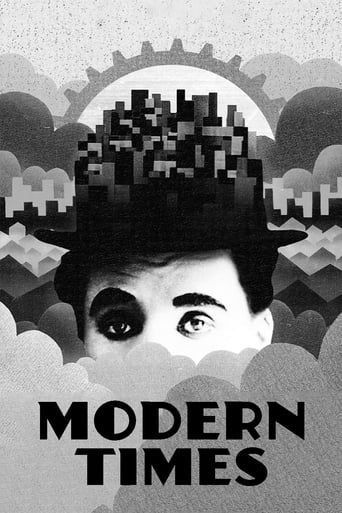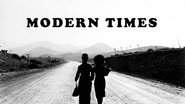adonis98-743-186503
The Tramp struggles to live in modern industrial society with the help of a young homeless woman. Mordern Times was definitely a very pleasant suprise full of humor but also kindness, Charlie Chaplin gives a terrific perfomance and that fight scene in the prison was so well executed and just so funny. Definitely a movie that deserves the rating it has and even tho Chaplin never speaks (although he sings a bit) he showcases his emotions with his face and that to me is called real artistic and oscar worthy acting and the man just had it as it seems. (A+)
Pjtaylor-96-138044
'Modern Times (1936)' is considered to be the last American 'Silent Film', made long after the era had essentially come to a close. It's fitting, then, that some use of sound seeps into the piece and usually signifies the modernisation of society, machines replacing man and bringing audio with them. It also gives us the first taste of The Tramp's voice, as he is forced into an uncomfortable situation simply to find work - though the song he sings is gibberish to keep the scene universally understandable. This picture is perhaps Chaplin's finest silent work because it not only has a message, taking a stance against the industrialisation of the workforce and its replacement by unthinking machines, but is also riotously entertaining throughout. It puts a smile on your face in the first scene and keeps it there until the last. Each slapstick set-piece comes incredibly close to brilliance, with a few easily crossing that threshold, and the feature is funny in the way only a film of this kind could be. It really is effortlessly entertaining and endlessly enjoyable, remaining a purely visual threat from beginning to end with some fantastic themes and inventive scenes. There isn't really a moment that doesn't work and the Tramp remains as endearing as ever. It's made even better because of its underlying point, one that is all the more relevant today and was actually somewhat clairvoyant, and is certainly one of the most purely cinematic pictures I've ever seen. A proper Chaplin classic. 7/10
Niall O'Hara
I watched Modern Times as my first Chaplin film and in fact, my first ever silent film. Being 21 years old I may have a different view on comedy and older films but I failed to see the deep emotional side of this film.The ending is emotional, thought out and very touching, but I personally felt that the simple plot consisted largely of slapstick comedy (which I have never been fond of) performed by a protagonist who could not function as a normal human being in modern society. Because of this, I found myself unable to relate to the film. I believe that a more 'normal' protagonist could have given this film much more meaning... saying this, if we had a 'normal' protagonist then this would not be a Charlie Chaplin comedy film.To summarise, my relatively low score out of 10 comes down to my age, my lack of understanding of Chaplin's history and my dislike of slapstick comedy. The reason the score isn't lower is due to my respect for Chaplin, silent films and old cinema as well as finding some of the moments in this film both amusing and touching.
lasttimeisaw
Mr. Chaplin's pièce-de-résistence, MODERN TIMES is his last silent feature, but rendered with an innovative adulteration of sound voices solely from mechanical devices, barring Chaplin's near-end humorous performance of THE NONSENSE SONG, for the very first time, audience hears the maestro's real voice from the screen in a gibberish ditty, one could only imagine the hype and excitement at then. MODERN TIMES introduces Chaplin's iconic screen alter-ego aka. little tramp as an assembly-line worker in the Depression era, the factory's pristine props hark back to Fritz Lang's METROPOLIS (1927), but less futuristic, more realistic in its scale of grasping capitalism under the efficiency- prioritizing doctrine whereas a proletariat like the tramp, has no means to secure an auspicious future and is inescapably subjected to the exploitation by the industrialized society, picked as a guinea pig for a novel lunch-feeding contrivance, constantly under the duress of the ever- accelerating assembly-line, after being engorged by it (a brilliant surreal light-touch), he is driven mad and wreaks havoc on the machine and is sent to hospital, subsequently, being mistaken as a Communist and thrown into the prison, where he accidentally becomes a hero by thwarting a jail- break attempt, but ironically because he is high on cocaine, which he mistakes for salt in his lunch. Yet, whenever he is given a new lease on life, reality will cunningly squash his effort although in some cases, he has only himself to blame for. There is a skewering political spin aiming at the modernized assembly line, the humongous machines, the callous industrialists and the oppressive authority, being buried underneath the surface of bang-up farces, which has been scarcely actualized in Chaplin's works before. The plot mainly consists of a string of superlative skits de rigueur, which is completely in Chaplin's elements, the tramp's free-flowing pantomime, delightful slapstick and ingeniously devised set pieces (although the stomach-churning duet crops up as a head-scratcher) are typically endearing to watch, what is more astonishing is how he can make tough stunts look incredibly effortless, in particular with sleight of hand, an arresting trompe l'oeil is accomplished when he roller-skates blindfold against a matted painting which puts viewers at the edge of their seats for his safety. The story also presents a fiery heroine, the gamin (Goddard), a recently orphaned girl who is anything but a damsel-in-distress, Goddard, although is not endowed with Chaplin's bent of physical comedy, is impeccably elemental in foregrounding the gamin's gallantry and loveliness, takes on a weighty counterpart against the tramp's unostentatious playfulness, together, they help each other out in the difficult times, share bitter-sweet moments. A self-encouraging coda might betray Chaplin's precaution that comedy has its built-in calling to look on the brighter side, by and large, MODERN TIME is a reverberating showcase of Chaplin's competence which further transcends its time and context.







